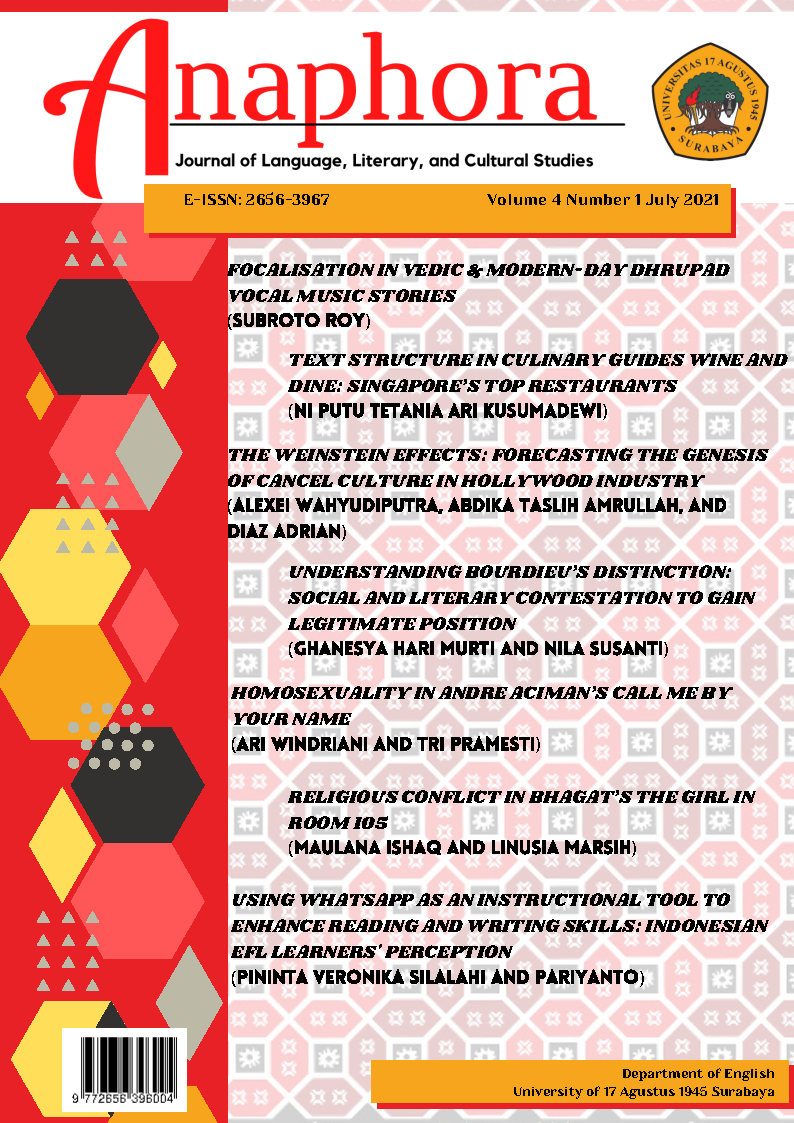UNDERSTANDING BOURDIEU’S DISTINCTION: SOCIAL AND LITERARY CONTESTATION TO GAIN LEGITIMATE POSITION
DOI:
https://doi.org/10.30996/anaphora.v4i1.5268Keywords:
contestation, social arena, taste, distinction, dominationAbstract
This writing reveals the subtle domination in the area of literature and social practice which is illustrated through the practice of coffee consumption and also the claims of legitimate authors. Bourdieu examines this sociological space as a field of contestation, so he constructs his sociological project by mapping the type of social power in arena in which every subject wagers his capital to achieve a legitimate position. In the arena, each subject desires to get power either by way of embracing the rule that applies, doxa, or to fight with the practice of the new, heterodox. Following the existing rules are not able to change anything because it dictates the subject to be a disciplined subject. Bourdieu proposes the emerging heterodox because doing resistance to all forms of domination can give birth to the new alternative social structure and preventing the old one to remain in power. Social change is expected because Bourdieu's symbolic power as in symbolic capital tends to provoke symbolic violence. Having symbolic capital enchanting for its power to subtly dominate people with less capital. Oppression becomes natural due to everyday practice normalizing the oppression. shapes the taste of a certain class as class distinction. Bourdieu’s concept of distinction investigates a more sophisticated strategy in the social arena where every agent plays subtle intimidation and indeed domination.
Downloads
References
Bourdieu, P, & Passeron, J. C. (1990). Reproduction in education, culture and society. In Trans. Nice, R. London: Sage.
Bourdieu, Pierre. (1990). Homo Academicus. Stanford University Press.
Bourdieu, Pierre. (1992a). Language and symbolic power. Polity Press.
Bourdieu, Pierre. (1992b). The logic of practice. Polity Press.
Bourdieu, Pierre. (1996). Rules of art: Genesis and structure of the literary field. Polity Press.
Bourdieu, Pierre. (1997). The field of cultural production: Essays on art and criticism. Columbia University Press.
Bourdieu, Pierre. (2013). Cambridge studies in social and cultural anthropology: Outline of a theory of practice series number 16. Cambridge University Press.
Bourdieu, Pierre, & Coleman, J. S. (1991). Social theory for A changing society. Westview Press.
Cibir Denny JA Masuk 33 Tokoh Sastra Berpengaruh, Saut Dijemput Polisi. (n.d.). https://regional.kompas.com/read/2015/03/26/17321731/Cibir.Denny.JA.Masuk.33.Tokoh.Sastra.Berpengaruh.Saut.Dijemput.Polisi
Haryatmoko. (2016). Membongkar Rezim Kepastian: pemikiran kritis post-strukturalis (Widiantoro, Ed.). Kanisius.
Jenkins, R. (2015). Pierre Bourdieu (2nd ed.). Routledge.
Karnanta, K. Y. (2013). PARADIGMA TEORI ARENA PRODUKSI KULTURAL SASTRA: KAJIAN TERHADAP PEMIKIRAN PIERRE BOURDIEU. Poetika, 1(1).
https://doi.org/10.22146/poetika.v1i1.10420
Ketika “ngopi” di Starbucks diancam “masuk neraka” oleh Ustad Somad - BBC News Indonesia. (n.d.). https://www.bbc.com/indonesia/trensosial-43920100
Saukko, P. A. (2003). Doing research in cultural studies: An introduction to classical and new methodological approaches. SAGE Publications.
Downloads
Published
How to Cite
Issue
Section
License
Authors whose manuscript is published will approve the following provisions:
-
The right to publication of all journal material published on the jurnal anaphora website is held by the editorial board with the author's knowledge (moral rights remain the property of the author).
-
The formal legal provisions for access to digital articles of this electronic journal are subject to the terms of the Creative Commons Attribution-ShareAlike (CC BY-SA) license, which means Jurnal Persona reserves the right to store, modify the format, administer in database, maintain and publish articles without requesting permission from the Author as long as it keeps the Author's name as the owner of Copyright.
-
Printed and electronic published manuscripts are open access for educational, research and library purposes. In addition to these objectives, the editorial board shall not be liable for violations of copyright law.















